
How to Calculate Your SEO Share of Voice
February 4, 2020
By Paul Schmidt
What Is SEO Share of Voice?
SEO share of voice is analysis that shows which websites rank most frequently for a given set of keywords or topics in organic search. This type of exercise helps website owners better understand competitive pressures in search engines as well as identify link building, content creation, and social media opportunities. Here is a framework for how you can identify your share of voice in organic search results and what you can do with this analysis upon completion.
How You Calculate SEO Share of Voice
Step 1: Pick Your Core Topics
Identify your target set of topics that you should be ranking for. This should be done through:
- Analyzing your personas.
- Mapping out your Buyer’s Journey for each persona.
- Interviewing actual prospects, customers, partners, and sales reps to validate your research. This is the actual process with every new client we take on.
- Conducting a competitive keyword gap analysis. (SEMrush makes this easy)
After going through this step, you should come up with 3-5 initial core topics that align with each of your personas and each stage of their respective Buyer's Journey.
Step 2: Pull Topical Rankings
Pull 1st-page-ranking domains for each of these topics. Using Moz, SEMrush or another keyword research tool, pull first-page-ranking exports from the top domains that are ranking for each of these core topics.
Here is how you would do this within Moz’s Keyword Explorer.
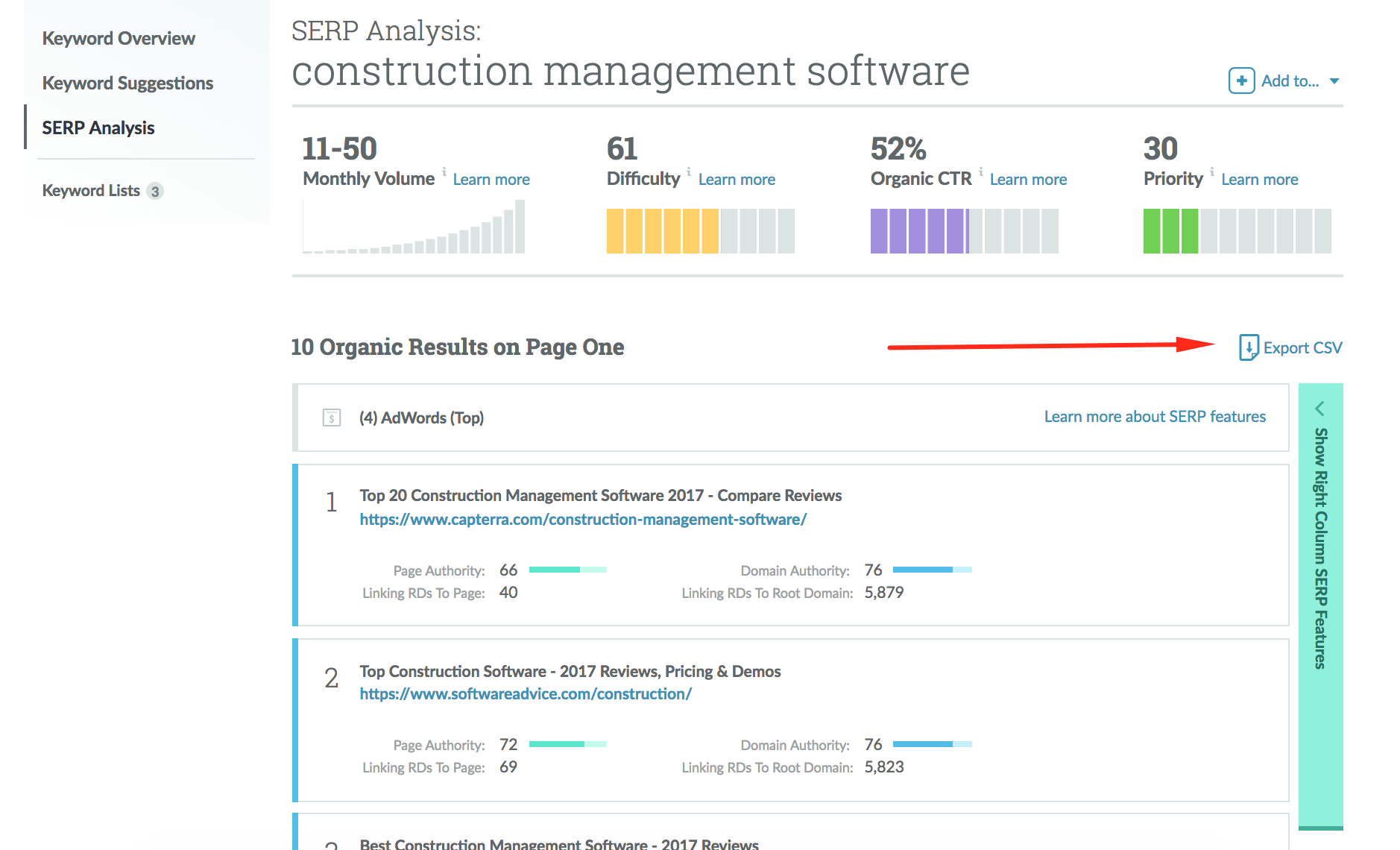
Here is how you would do this within SEMrush's Keyword Overview report:
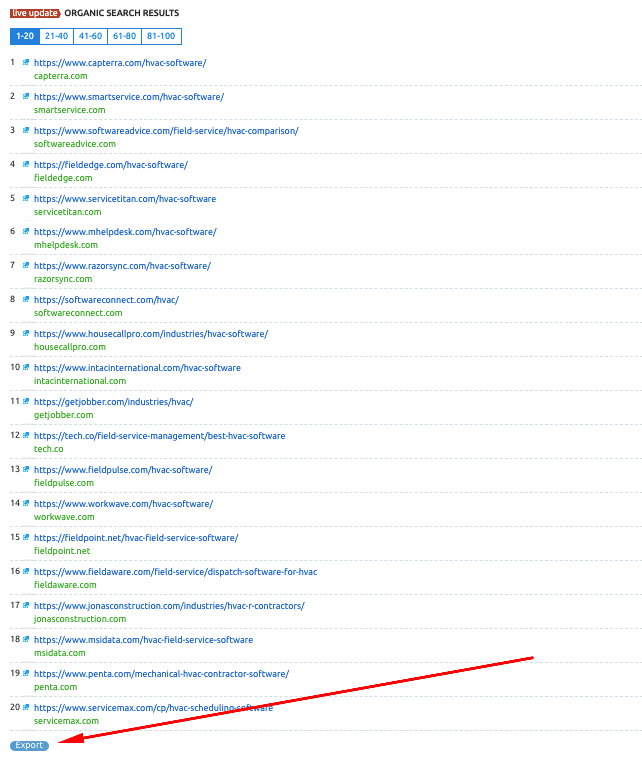
Step 3: Pivot Table Time
Put these domains in a pivot table to see how many times a domain is ranking across a given set of topics. Calculate the number of times you rank divided by the number of total domains that are ranking.
Here is a mockup analysis examining four “construction management software” related topics. As you can see based on this chart, here are the domains that are ranking most frequently for these keywords.
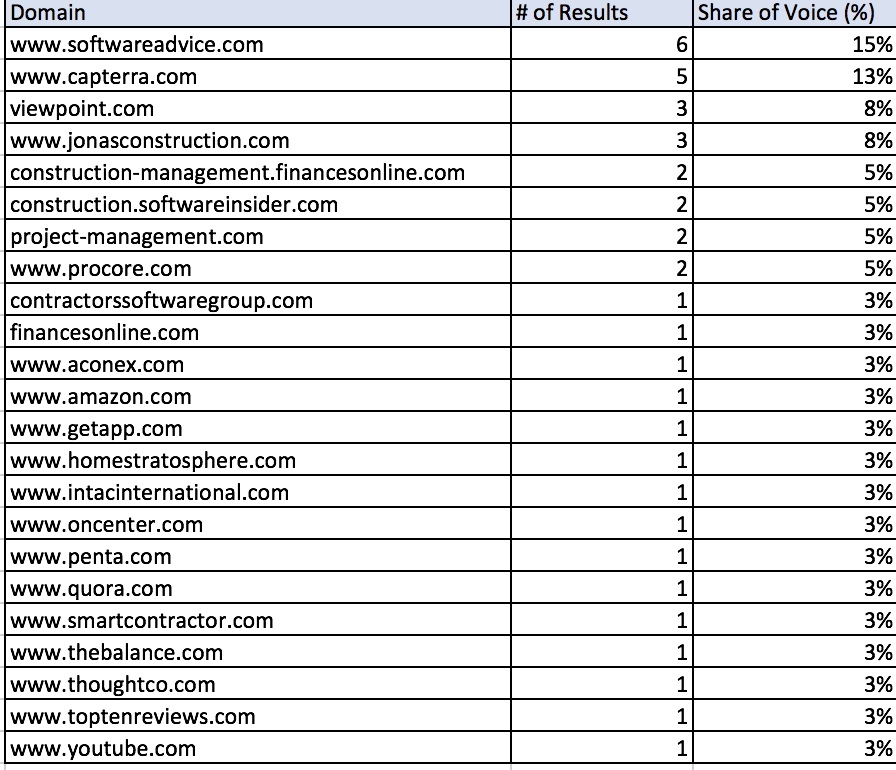
Here is what that looks like in pie-chart format:
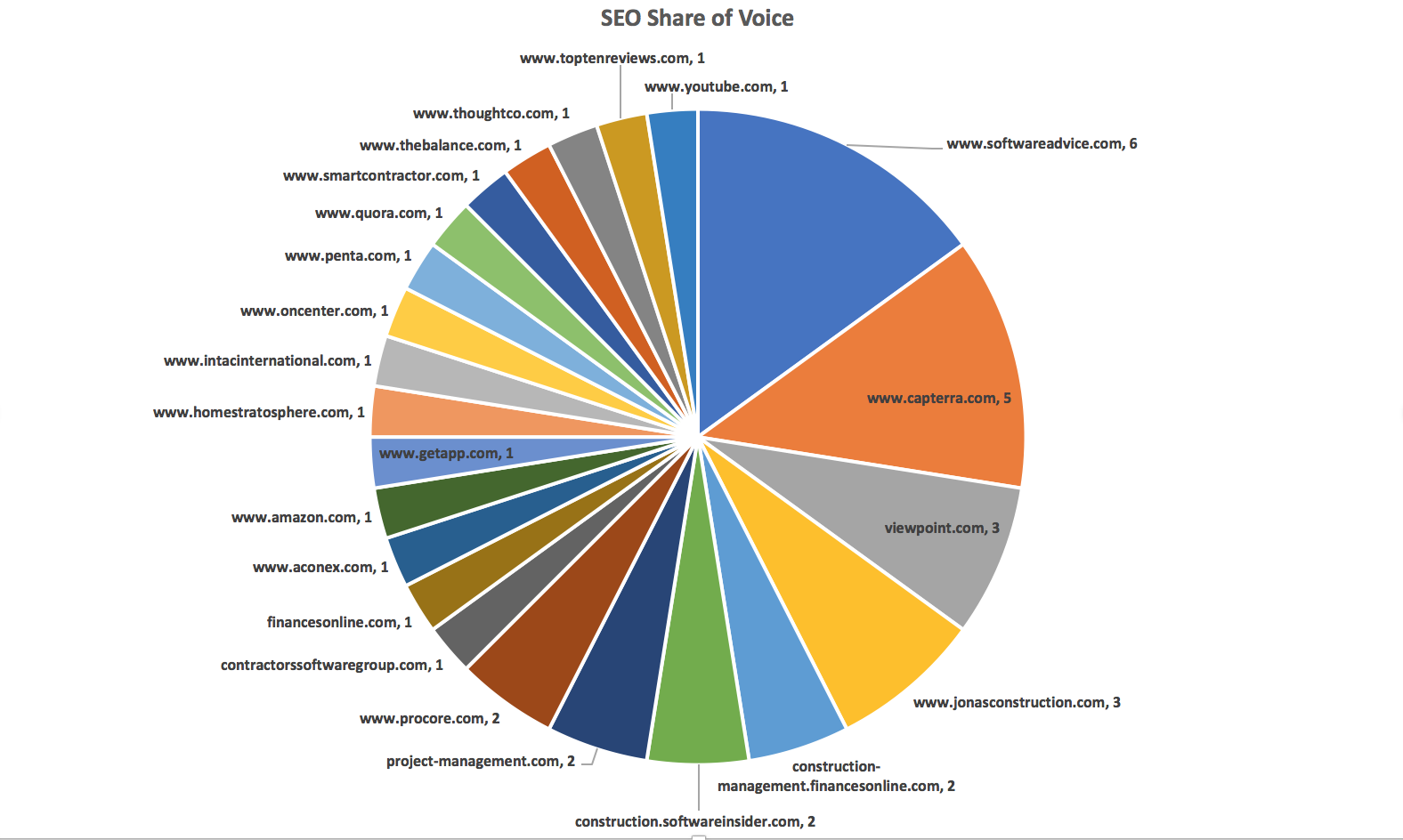
What you can see above is that within this share of voice analysis that software review sites like Capterra and SoftwareAdvice.com have a larger share of voice compared to individual software brands, industry news or social media sites. This type of analysis opens up a door that will help you understand what it will take for you to rank for a broader share of topics within your industry.
In this specific case, if you are a small software brand, focus your efforts on improving your listing's rank within those software review sites (via more 5-star reviews). It may be a futile effort trying to outrank competitively-positioned review sites for certain topics on Google.
As an aside, When doing this share of voice analysis for your own organization, pull rankings for at least 15-30 keywords. That way, you are able to get a broader set of domains and topics.
Once you have this analysis, here are some actionable ways you can use this data to help your organization.
How to Use SEO Share of Voice to Improve Your Marketing
Content analysis:
See the types of content these competitors are creating that may be helping their ranking.
- Format Analysis: What is the format and length of the content your competitors are creating? Is it text, video, audio, visualizations? Is it long-form or shorter?
- Information Architecture: How are your competitors structuring their product or editorial content? Are they using a pillar content structure with thoughtfully organized internal linking?

- Topical Analysis: What are the types of topics they are focusing on? Are the pieces that are ranking well covering your topics in-depth, or are they summarized? Are there certain topics they are writing about that you have never added to your site?Another great tool to use here for topical analysis is Moz’s Keyword Explorer to see some of your competitors’ ranking keywords.
This Moz report shows the overlap of ranking keywords from HubSpot, Marketo, and Pardot:
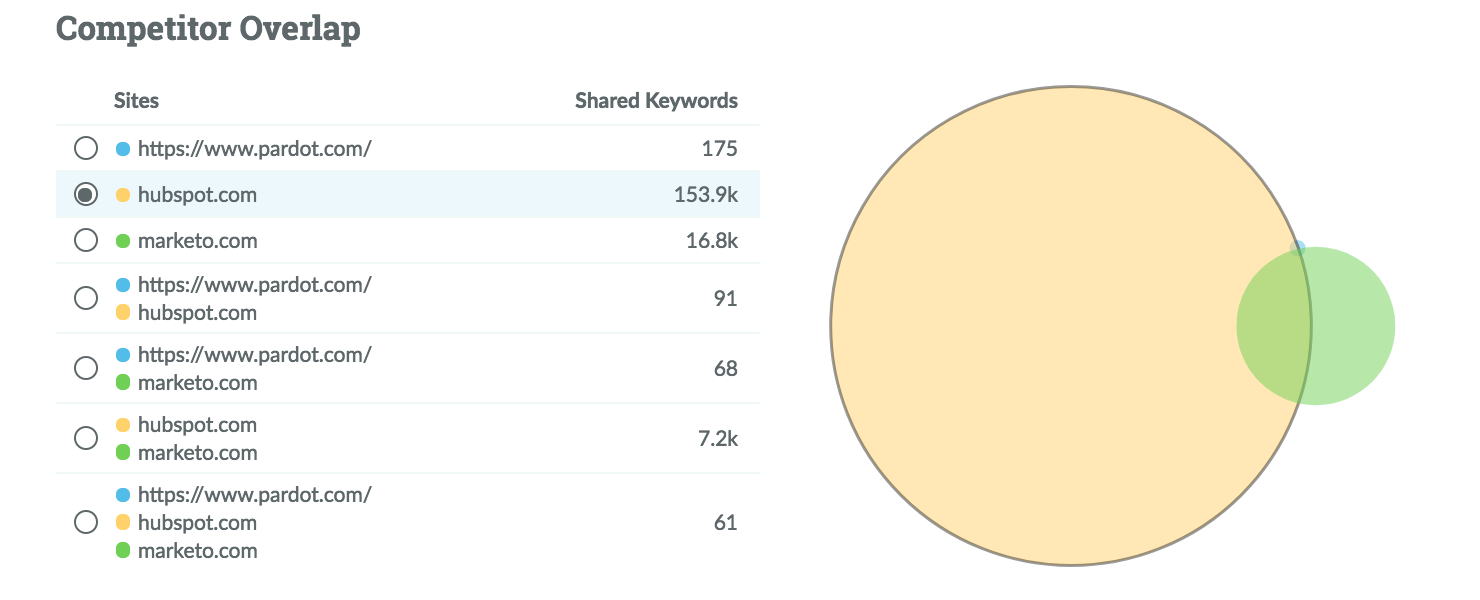
SEMrush's keyword gap tool tells a similar story: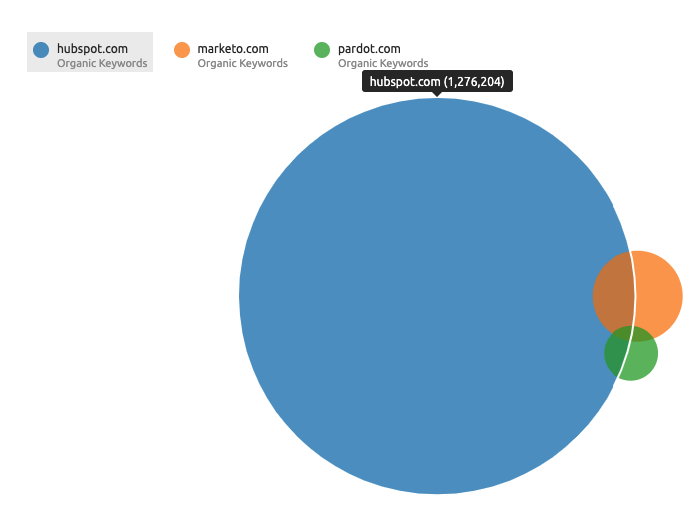
Social Media and Promotion:
- Promotion Channel: What types of content are resonating best across your competition? This can help you identify new promotional channels and types of social campaigns you could potentially run.
- Influencers and Publications: Who are the major publications and influencers that are sharing or linking to your competitors’ content? This could be a good opportunity for PR or outreach to build relationships with these sources.
- Public Forums and Social Media: Identify public forums or social channels that you can take advantage of. It’s going to be near-impossible for you to outrank certain authoritative, reputable channels in search. For example, if Quora ranks well within the share-of-voice analysis, don’t fight Quora. Instead, become more active on those channels, so you have more visibility on those channels when users go there.
Some example of other channels that frequently come up in organic search listings that you could take advantage of include LinkedIn, YouTube, Pinterest, and Reddit.
Link building:
- Link intersection: What links do your top competitors have that you don’t have? You can pull this analysis from SEMRush, Moz, or HubSpot.
- SERP features: What are some of the SERP features that show up most frequently in your topic set? There are dozens of organic search SERP features that you have the ability to show up in (excluding paid search listings like Google Ads).
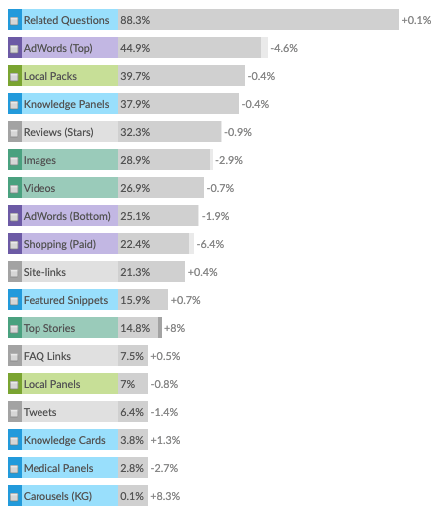
Source Data from 1/24/2020: http://mozcast.com/features
- SEO Opportunity: When looking at all the listings in the SERPs (both paid and organic), are paid ads pushing out organic listings? If you have a low opportunity to rank organically for this given set of topics due to overwhelming organic and paid competition, SEO may not be the best channel you should invest in compared to other channels.
There are many more things you can do once you have a better understanding of your organic share of voice and once you start to realize that your SEO competition is often a lot different from your direct competition.
This post was originally published in December 2017 and has been updated since.

About the author
Paul Schmidt is a director of services strategy at SmartBug Media. He previously worked at HubSpot, helping develop inbound strategies for over 200 clients. His past clients include: Travelers Insurance, Unilever, and the SABIAN Cymbal Company. Paul studied percussion in Las Vegas and got his MBA in marketing in Boston Read more articles by Paul Schmidt.





![[Webinar]-Diagnosing-and-Solving-SEO-Issues-cover](https://www.smartbugmedia.com/hs-fs/hubfs/Webinar%20CTA.png?width=200&height=260&name=Webinar%20CTA.png)



